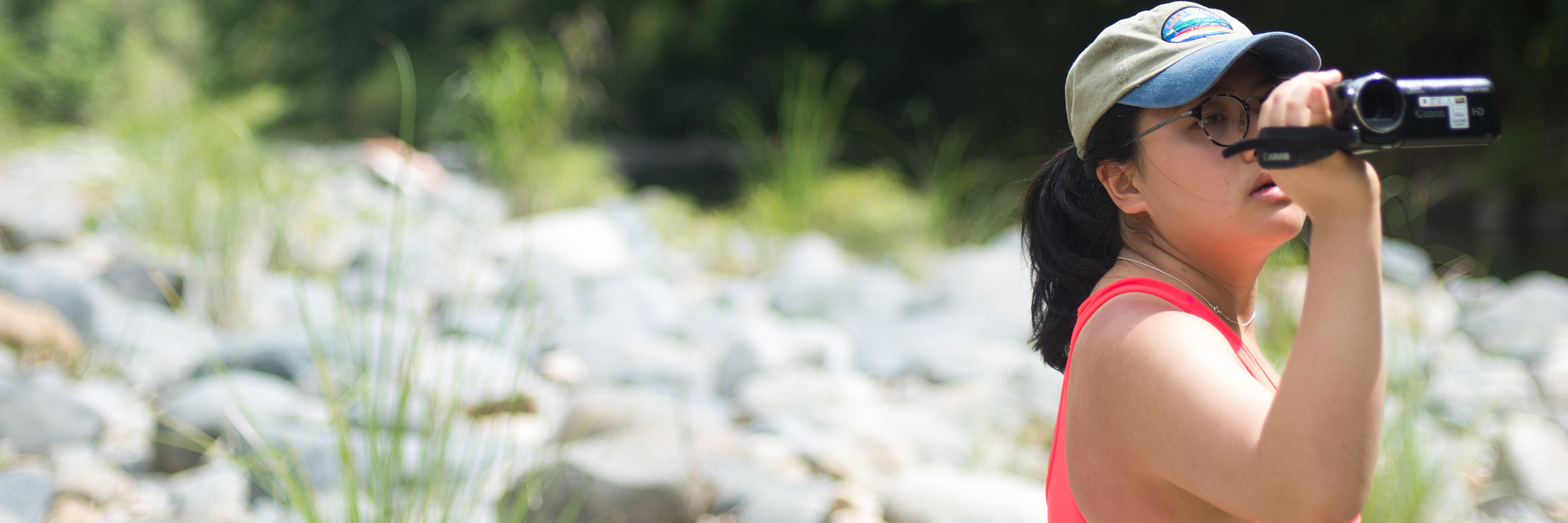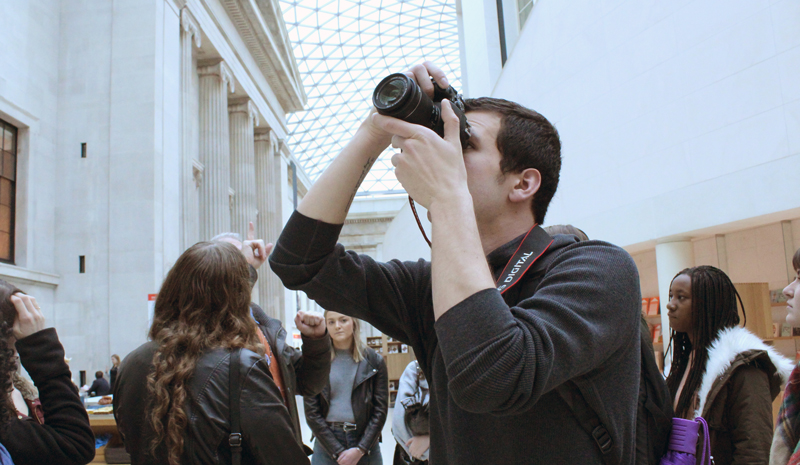

- Home
- Journalism
- Undergraduate Journalism
- Curriculum
- Journalism in Practice
Journalism in Practice
During your time at Medill, you'll have the opportunity to learn and polish your journalism skills through a core course called Journalism in Practice.
Many sections of this sophomore-level class incorporate an international travel experience. During spring break, you and faculty travel overseas to report in a different country. Other sections offer hands-on reporting experiences in the Chicago area. Whether overseas or closer to home, you will develop your skills with faculty who are invested in opening new worlds to you.

Here is a Sample of Medill's Global Journalism in Practice Sections:
- Arts and Entertainment Reporting in London
Taught by Assistant Professor Karen Springen
With travel during spring break to LondonThe arts, culture and the media play an enormous role in London, a historic city built by the Romans 2,000 years ago and renowned for its theater, museums, street art, music, festivals and architecture as well as for its tabloids and the BBC. This class explores how to pitch, report and write in these areas in both the United States and the United Kingdom. Students will learn the basics during class in Evanston and will research story ideas before traveling to Britain. During this week abroad, they will immerse themselves in the culture of England and will conduct a Q&A and possibly other interviews for stories that they will pitch and write once back on campus.
- Israel Today: Divergent Dreams in a Promised Land
Taught by Adjunct Lecturer Bob Rowley
With travel during spring break to IsraelIsrael is a modern nation caught in the crosswinds of ancient history, religious strife and political turmoil—with Palestinians seeking a state of their own on shared, disputed land. Modern Israel plays an enormous role in Mideast politics and impacts millions of Americans. The struggle between Israelis and Palestinians and their relations with neighboring Arab nations are the focus of worldwide media coverage. It’s one of the most challenging areas for journalists to navigate and cover—and it has an outsized influence on the region.
This class explores U.S. policies and the opposing narratives of the current conflict over the West Bank, Gaza and the future of Israel and Palestine themselves – and some extraordinary history, filled as it is with politics and passion, diplomacy and dislocation, holy land and unholy war.
Israel/Palestine is a multi-cultural arena of divergent dreams and destinies. The class will examine political strife, peace efforts, archaeological finds, high-tech start-ups, Israeli settlers and Palestinian refugees, the threats on Israel’s borders, the nations that compete for influence and Mediterranean food and culture, from Jerusalem to the West Bank, Ramallah to Tel Aviv.
- The Journey of the International Student
Taught by Professor Mei-Ling Hopgood
With travel during spring break to Shanghai, ChinaOne-third of international students are Chinese. In 2016-17, the number of international university students at higher education institutions in the United States approached 1.1 million, according to the Institute of International Education. International students, who are recruited aggressively, contribute billions in tuition and other costs yearly and impact their campuses and surrounding communities. These young people undergo dramatic changes, adapting to a different language, culture, society and educational system. They struggle with racism and isolation, fall in love and start companies. Others drop out and return to their home countries. In this class, we will explore the varied stories of international students, with emphasis on the experience of Chinese student.
This class will explore issues of identity, race, culture and journalism of empathy. Students may choose to be part of a voluntary academic study of journalism, experiential learning and ideological change.
- Visual Reporting in Cuba
Taught by Assistant Professor Caryn Ward
With travel during spring break to CubaJust ninety miles from the U.S., Cuba has been a world away in terms of politics, economics and culture. For most Americans it’s been a mystery shrouded in Soviet-style communism and a failed attack at the Bay of Pigs. Now in post-Castro (Fidel and Raoul) Cuba the shoots of market capitalism are sprouting and Americans are once again discovering the island where Ernest Hemingway wrote some of his most famous works. Through this class and its accompanying trip, students will get an intensive look the current events of the island in context of history.
This class will emphasize the development of reporting skills (diversity of sources, interviewing, background research and verification) and telling stories in a visual medium – either photo or video. Although the focus will be on visual reporting students will be asked to write components necessary for full reporting, such as captions, sidebar articles and/or introductions. Students will produce one major reporting project and two smaller ones by the end of the quarter.
Students will be asked to read articles and books and watch videos and documentaries that will help them think critically about the seismic changes happening in Cuba today and the issues that raises for its people.
Here is a sample of Chicago-based Journalism in Practice sections:
- Environmental Reporting in a High Stakes Climate
Taught by Associate Professor Abigail Foerstner
Learn to tell compelling stories about climate change, toxic wastes, lead in water and health risks in our food. Environmental regulations and funding are under attack; environmental reporting is critical to ensure people the knowledge and power to meet threats that could impact their health and families. We will report from the living laboratory of the Chicago area on increasingly severe weather, polluted rivers, toxic wastes in neighborhoods and threats to the Great Lakes. We will report on the actions of policy-makers on both sides, of advocacy group on both sides and of initiatives by communities, schools and innovators. Learn the strategies to be watchdog reporters now when the stakes are so high. Many of our stories are published with the Planet Forward environmental website based in Washington, D.C.
- “Chicago Never a Lovely so Real”
Taught by Professor Louise Kiernan
"You may well find lovelier lovelies,” the author Nelson Algren once wrote of Chicago. “But never a lovely so real.” In this course, we will examine both what is lovely and what is real about this city by producing journalism about a cluster of critical issues seen through the lens of the Chicago neighborhood where our class will be based. Shaped by your individual interests, we will explore topics that may range across criminal justice, arts and architecture, education, public health, immigration, politics and more, as we learn firsthand about the people, places and moments that define this vibrant, challenging city.
- Court Watchers: The Legal Beat
Taught by Professor Michael Deas
Covering trials is one of the most significant aspects of journalism, but few journalists know how to do this correctly. This new course provides students with the knowledge they’ll need to do impartial, unbiased and accurate reporting of hearings and trials. Court Watchers will focus on proceedings in criminal courts and possibly others, like mental health, domestic and veterans. Court Watchers will be a valuable course not only for future journalists, but students who may be considering a legal career.
- Chicago Divided: Northside vs. Southside, Cubs vs. White Sox
Taught by Professor Jon Marshall
The heated rivalry between the Chicago White Sox and Chicago Cubs baseball teams reflects the longstanding tensions between the city's South and North Sides. This section of 301 Journalism in Practice will allow students to explore the intersection between sports and society as this rivalry plays itself out along lines of race, ethnicity and class in the city's politics, economics, housing, social services and culture. Potential reporting topics include gentrification around the ballparks that makes affordable housing less available, the efforts of local social service organizations, the struggles of neighborhood businesses, and the cultural identification of residents with the teams' players. The course will emphasize the development of writing and reporting skills (diverse sourcing, interviewing, data analysis, background research and verification). Although it will focus on improving writing, students can tell their stories using text, video, audio and graphic formats. Students will produce one major reporting project and at least two smaller ones by the end of the quarter. Students will be asked to read articles and books and watch documentaries that will help them think critically about the issues facing the sports world and Chicago's neighborhoods on the South and North Sides.
- Police, Politics, Race and Community
Taught by Professor Peter Slevin
This is a workshop designed to tell true stories about some of the most complex and emotional challenges any diverse community faces. We will explore perspectives on politics and policing in Evanston in the wake of the Black Lives Matter era and the arrival of Donald Trump 2.0, building our expertise through rigorous reporting and thoughtful interviews with a wide array of sources on all sides of a series of crucial questions. Present-day politics and the city’s history alike are central to the equation. Evanston became the first municipality in the country to address its historic racism through taxpayer-funded reparations. Meanwhile, voters will be assessing the fallout from the April 1 elections for city council and school board. Taught by Peter Slevin, a contributing writer for The New Yorker, this workshop that will start with questions, not answers. Be prepared to examine broad social stereotypes as well as your own assumptions. We will pay particular attention to interviewing techniques and the voices that inform and illuminate ambitious journalism. Plan on getting out of the classroom to do plenty of reporting. Interested students will be able to pitch stories to The Evanston RoundTable, which has published pieces produced for this class.

